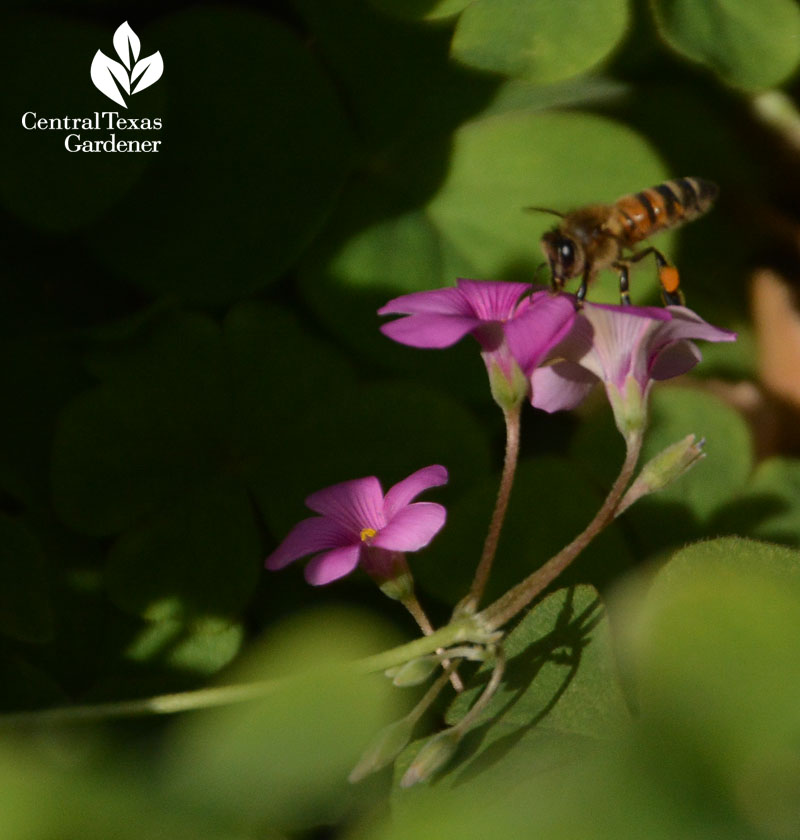January 5, 2017
Slow the Water Flow with Earth Kind Designs
Some folks banish oxalis when it sneaks in, but not me! I relish this reliable winter groundcover that keeps bees busy on warm days.

I’m a big fan of dandelions, too, as are bees and tiny insects like this guy.

Chickweed took over the vegetable bed, but that’s okay, since its lemony flavor is great in nutritious salads. And our house bunnies (and chickens, if you have them) love it.

Find out more about chickweed and cleavers (“Velcro” plant) from herbalist Ellen Zimmermann (and CTG’s video with Trisha).
@TXPlantGuy Daniel Cunningham from Texas A&M AgriLife Research Center at Dallas forages for meals among plants that manage on their own. As Horticulturist and Program Coordinator at Water University, he promotes water-saving techniques in landscapes and vegetable beds.

Since dry times overrule rainfall, Daniel joins Tom to take the waste out of water with easy tips for conservation. Watch now.

Check out Water University’s quick DIY to make a rain barrel out of a recycled food grade drum. This is so cool!
SO, #WaterUDoing? Find out what @TXPlantGuy’s up to on Twitter, Facebook, and Instagram. And check out Water University for easy ways to slow the flow.
Retama, also called Palo Verde (Parkinsonia Aculeata), survives on little water to support pollinators and birds.

Daphne’s Plant of the Week is cultivar ‘Desert Museum’ Palo Verde, which flaunts that beautiful structure and green bark, but is thornless and blooms months longer.


But what happened to Justin Derx’s live oak tree? Twice he’s come home to find it lying on its side. He replanted and staked and it seemed stable, but now it has a large wound at the bottom.

Can it be saved? The wound’s not an issue, but the root of the problem could be girdling roots. Get Daphne’s answer about what to do.
Now, what about pruning those fruit trees in our own little orchards? Trisha demonstrates the basics for healthy, hefty pears.

On tour in Georgetown, Williamson County Master Gardeners demonstrate Earth Kind techniques from food to flowers.

They can even tell you how to use nutsedge, though for now, they’re digging it out of vegetable beds, careful not to harm the abundant earthworms underneath.

Many of these Master Gardeners hail from other parts of Texas, the U.S., and even Canada. They signed up for MG training to learn how to tackle Central Texas tough.

Demonstration beds illustrate options in size, budget, and style.


They start some crops from seed in home greenhouses to transplant into row gardens. Every season, they analyze what varieties did best to help you!

Luscious harvests fill many plates all year at the Caring Place and the Annunciation Maternity Home in Georgetown.

Compost, compost, compost is their secret to Earth Kind success.

Four vegetable beds for Texas A&M grow on compost alone with limited water and no fertilizer or pesticides. They record every detail to determine timing and productivity; results that will assist your choices.

Fragrance almost toppled us walking through the Texas A&M Field Trial Earth Kind herbs.

I vowed to stretch more to be as limber as everyone we met. I didn’t hear a groan all day!

They’re even growing herbalist explorer Madalene Hill’s ‘Hilltop’oregano. Wish this dear mentor of mine was still here to see it.

To control rainwater runoff down the slope from the street, they dug out swales and built up berms.

The Earth Kind rose garden shows that you can indeed grow roses without killing your water bill or filling your shed with chemicals.

When we taped, their drought tolerant garden was very young. Structural agaves and yuccas join perennial flowers for pollinators and seeds for birds.

Their spacing helps home gardeners translate very small native and adapted plants to the room they’ll need when mature. The design illustrates how to companion perennials in a sunny garden.

Eventually, ‘Desert Museum’ Palo Verde will offer light shade. Native silver ponyfoot (Dichondra argentea) and artemisia spark against green foliage.

Master Gardener Steve Echols breaks up the visual pace with intricate rock sculptures. Toads and lizards appreciate the architecture, too.

The gardens are always open to the public and you can talk to the Master Gardeners on work days. Check out Williamson County Extension for all their programs, events, and info to get you growing!

Thanks for stopping by! Linda

